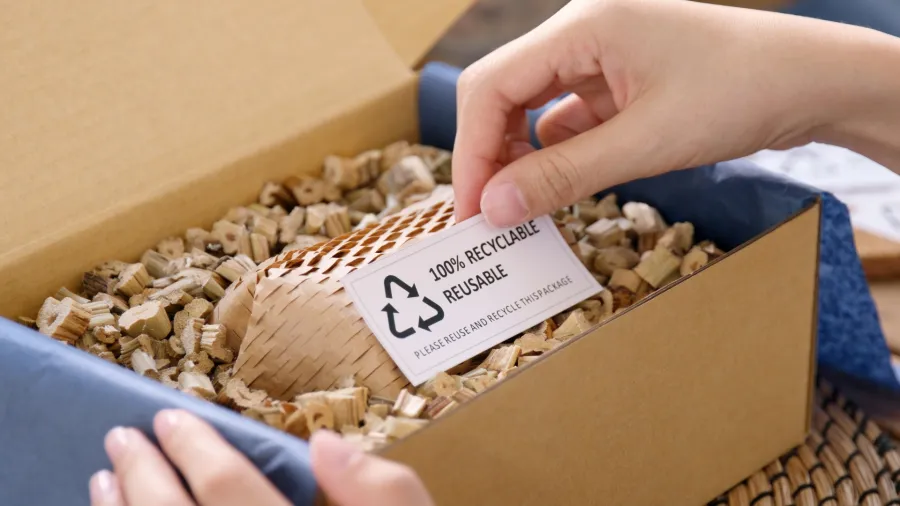
Ways retailers can start waste reduction efforts amidst charging scheme delay
Experts recommend adopting mono-material packaging and encouraging naked shopping.
As Hong Kong’s waste charging scheme faces indefinite postponement, experts recommend that retailers proactively begin their sustainability and waste reduction efforts, starting with packaging optimisation and inventory management.
Robert Lockyer, founder & chief client officer of Delta Global, said these two efforts come hand-in-hand as retailers can use inventory management tools to gain data-driven insights on the usage and demand of packaging across the supply chain.
“Use this data to rationalise your product range and optimise inventory,” Lockyer said, adding that doing so would reduce unnecessary overproduction of packaging.
The expert suggested that retailers review their packaging and implement strategies to minimise waste, such as using recyclable, biodegradable, or reusable materials rather than single-use plastics.
Contrary to what most believe, Lockyer said “packaging does not necessarily mean higher expenses” and pointed to some affordable recyclable packaging options.
One option that retailers can consider to increase recyclability is mono-material packaging.
“Recycled paper and cardboard are cost-effective and widely available materials for packaging like shopping bags, boxes, and mailers. The use of mono-material for all components of the packaging including bags, boxes, handles, and base facilitates easier recycling,” Lockyer told Hong Kong Business.
“Brands could collaborate with paper mills and recycling partners like Mil Mill to source sustainable paper pulp and recycled paper products,” he added.
Retailers can also opt for responsibly sourced materials like Tencel for ribbons instead of plastic and friction-fit systems instead of magnets.
Lockyer said 67.9% of the packaging used by Delta Global is from responsibly sourced and certified materials like FSC-certified paper.
If switching to new materials is too costly, he advised retailers to simplify their packaging design instead.
He said eliminating excessive layers, adhesives, and decorative elements can reduce material usage and costs. “The ‘less is more’ approach aligns with the growing consumer demand for sustainable, minimalist packaging,” said the expert.
Beyond packaging
Reducing waste goes beyond just packaging, said the Delta Global founder, reiterating that inventory management platforms, forecasting tools, and leveraging advanced technologies like AI-powered planning can “minimise unnecessary shipping, carbon footprint and excessive stock, leading to significant cost savings.”
“Taking a comprehensive approach to reviewing the entire production cycle, including waste reduction and optimising packaging range and composition, can also result in long-term cost reductions,” Lockyer told Hong Kong Business.
Other parts of the production cycle that retailers must focus on are product design and retail operations.
He recommended that retailers evaluate the entire lifecycle of products, from initial use to reusability and eventual recyclability.
The Delta Global expert advised retailers to enhance their teams' skills in sustainable design and identify recyclable solutions for Persistent Organic Pollutants (POPs) to develop more eco-friendly product designs.
Retail operations
To make operations more sustainable, Lockyer said retailers may engage customers in-store to promote reuse practices for products or packaging and offer valuable recycling tips.
“Offer take-back or recycling programmes that allow customers to return used or unwanted items, which can then be recycled or repurposed. This not only reduces waste but also builds customer loyalty and demonstrates the brand’s commitment to sustainability,” Lockyer added.
Global smart commerce platform, SHOPLINE in its Hong Kong eCommerce Whitepaper 2024, had a similar recommendation, saying businesses should implement and encourage the use of package recycling systems.
“Businesses can motivate consumers to recycle packaging materials by offering rewards or incentives. This approach encourages responsible disposal habits among consumers while facilitating a circular economy model of consumption,” SHOPLINE said.
It suggested that businesses also promote in-store pickup and smart locker delivery as eco-friendly alternatives to traditional point-to-point delivery.
“Businesses can incentivise customers to choose these delivery options by offering shopping credits and coupons in parallel. If implemented strategically, rewards like shopping credits can also foster customer loyalty and encourage repeat purchases,” said SHOPLINE, which is one of Asia’s leading software-as-a-service and solution providers.
“Naked shopping” or zero-waste shopping can also be an option for retailers to reduce waste. SHOPLINE underscored that the practice encourages customers to “buy in bulk and to bring their reusable containers to store products.”
“Naked shopping has the potential to reduce waste significantly as products have minimal packaging that is usually made with recyclable materials and it especially avoids the need for single-use plastics,” SHOPLINE added.
Industry support
The Municipal Solid Waste (MSW) charging scheme, should it finally be implemented, will present opportunities for retailers to enhance their sustainability practices and improve their bottom line, said Lockyer.
In response to the changes expected from the scheme’s implementation, Delta Global partnered with Mil Mill, OnTheList, Redress, and PolyU SFT to form the Sustainable Retail Collective, aiming to support Hong Kong retail and fashion brands in adopting sustainable practices.

“The collective will implement a range of support measures, starting with the launch of an informative and instructional guidebook, titled ‘No Time to Waste,’, available to the fashion and retail industry at no cost,” Lockyer said.
“The guidebook offers valuable insights, debunks common misconceptions, and provides practical tips and advice to help brands enhance sustainability efforts when it comes to sourcing materials, product design, manufacturing, retail operations, packaging, product end-of-life, and more,” he added.
The expert reiterated that the delay in the MSW Charging Scheme “should not be seen as a reason to delay action.”
“Forward-thinking businesses should take this delay as a chance to get ahead of the curve. By reviewing their current sustainable practices throughout their supply chain and implementing their waste reduction initiative,” he said.



















 Advertise
Advertise








